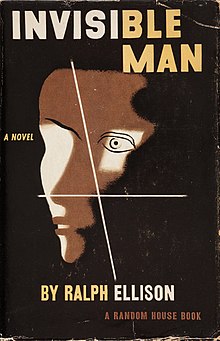 Front dust jacket art of the first edition | |
| Author | Ralph Ellison |
|---|---|
| Cover artist | Edward McKnight Kauffer |
| Language | English |
| Genre | |
| Publisher | Random House |
Publication date | April 14, 1952[1] |
| Publication place | United States |
| Media type | Print (hardcover and paperback) |
| Pages | 581 (second edition) |
| ISBN | 978-0-679-60139-5 |
| OCLC | 30780333 |
| 813/.54 20 | |
| LC Class | PS3555.L625 I5 1994 |
Invisible Man is Ralph Ellison's first novel, the only one published during his lifetime. It was published by Random House in 1952, and addresses many of the social and intellectual issues faced by African Americans in the early 20th century, including black nationalism, the relationship between black identity and Marxism, and the reformist racial policies of Booker T. Washington, as well as issues of individuality and personal identity.
Invisible Man won the U.S. National Book Award for Fiction in 1953, making Ellison the first African-American writer to win the award.[2] In 1998, the Modern Library ranked Invisible Man 19th on its list of the 100 best English-language novels of the 20th century.[3] Time magazine included the novel in its 100 Best English-language novels from 1923 to 2005 list, calling it "the quintessential American picaresque of the 20th century", rather than a "race novel, or even a bildungsroman".[4] Malcolm Bradbury and Richard Ruland recognize a black existentialist vision with a "Kafka-like absurdity".[5] According to The New York Times, Barack Obama modeled his 1995 memoir Dreams from My Father on Ellison's novel.[6]
- ^ Denby, David (April 12, 2012). "Justice For Ralph Ellison". The New Yorker. Retrieved July 23, 2018.
- ^ "National Book Awards – 1953". National Book Foundation. 1953. Archived from the original on November 5, 2018.
- ^ "100 Best Novels". Modern Library. Retrieved May 19, 2014.
- ^ Grossman, Lev (January 7, 2010). "All-TIME 100 Novels". Time – via entertainment.time.com.
- ^ Malcolm Bradbury and Richard Ruland, From Puritanism to Postmodernism: A History of American Literature. Penguin, 380. ISBN 0-14-014435-8
- ^ Greg Grandin, "Obama, Melville, and the Tea Party". Archived November 6, 2018, at the Wayback Machine The New York Times, 18 January 2014. Retrieved on 17 March 2016.